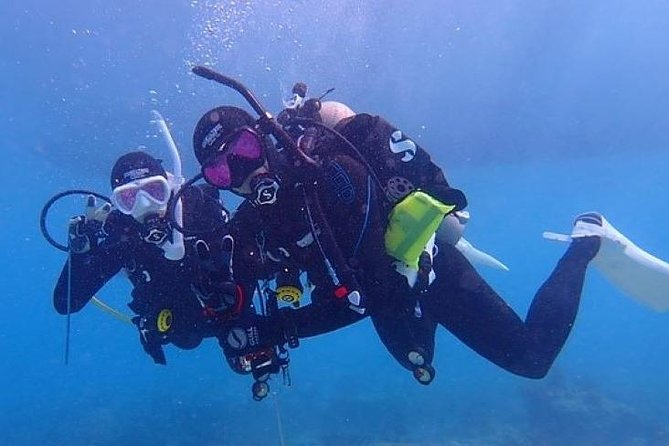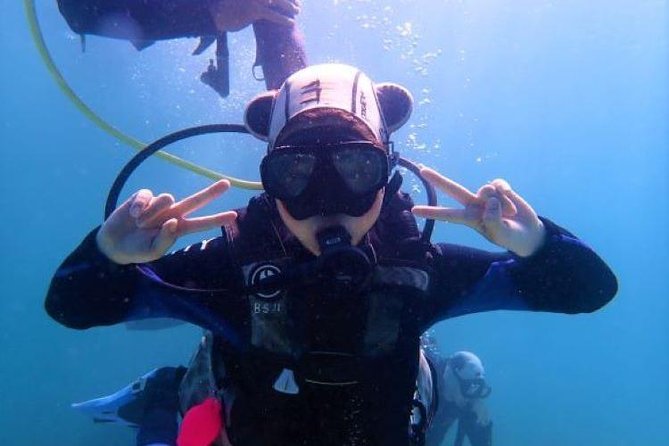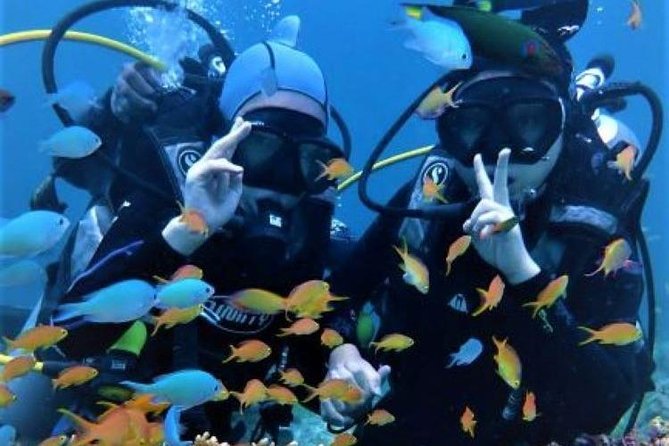Diving into the world of scuba diving and water sports is like unlocking a hidden treasure trove of aquatic adventures waiting to be discovered.
The lure of the ocean’s depths and the thrill of high-speed water activities beckon to those seeking an unforgettable experience.
With a blend of tranquility and adrenaline, these activities offer a unique escape from the ordinary.
So, what secrets lie beneath the surface?
Key Takeaways

- Improved cardiovascular health, strength, and flexibility
- Mental well-being and stress relief
- Environmental awareness and conservation
- Thrilling aquatic activities in top destinations
Here's more tours and experiences happening nearby.
Benefits of Scuba Diving

Scuba diving offers an exhilarating way to explore the underwater world while reaping numerous physical and mental benefits. The health benefits of scuba diving include improved cardiovascular health, increased strength and flexibility, and stress relief.
Immersing oneself in the underwater environment can also have positive effects on mental well-being, promoting relaxation and reducing anxiety. Furthermore, scuba divers often develop a greater appreciation for marine life and ecosystems, leading to heightened environmental awareness and a desire to protect our oceans.
Top Water Sports Destinations
Exploring the world’s top water sports destinations offers adventurers the chance to engage in thrilling aquatic activities while discovering stunning marine environments. From beachfront resorts to tropical paradises, these destinations provide the perfect backdrop for water sports enthusiasts. Here are some top water sports destinations to consider:
| Destination | Activities Available | Highlights |
|---|---|---|
| Maldives | Scuba Diving, Snorkeling, Water Skiing | Crystal Clear Waters, Vibrant Coral Reefs |
| Hawaii | Surfing, Paddleboarding, Jet Skiing | Big Wave Surfing, Lava Rock Formations |
| Australia | Windsurfing, Kiteboarding, Kayaking | Great Barrier Reef, Marine Wildlife |
These locations not only offer a range of water sports but also boast breathtaking natural beauty, making them must-visit spots for water sports lovers.
Safety Tips for Diving

For safe diving practices, always remember to thoroughly check your equipment before entering the water. This step ensures your gear is functioning correctly, reducing the risk of equipment malfunctions underwater.
Additionally, dive buddy safety is crucial when diving. Always dive with a partner, stay together throughout the dive, and communicate effectively. Establishing and understanding diving signals is vital for maintaining communication underwater. These signals help you convey important messages to your dive buddy, such as indicating if you’re okay, need assistance, or want to ascend.
Gear Essentials for Water Activities

Before venturing into the water, always ensure your gear is properly checked to guarantee its functionality and reduce the risk of any equipment issues during water activities. Water safety is paramount when engaging in water sports, and having well-maintained gear is essential for a safe and enjoyable experience.
Regular equipment maintenance, such as rinsing off saltwater after use, checking for any damages, and ensuring proper storage, can prolong the lifespan of your gear and ensure it functions correctly. Properly fitting gear, like wetsuits, masks, fins, and buoyancy control devices, is crucial for comfort and safety in the water.
Marine Life Encounters
Encountering diverse marine life adds a captivating dimension to your underwater adventures. Here are some key aspects to consider when encountering marine life:
-
Underwater Photography: Capture the beauty of marine species while diving by investing in underwater photography gear.
-
Respect Marine Conservation: Be mindful of marine ecosystems and follow guidelines to protect the underwater environment.
-
Observe from a Distance: Appreciate marine life without disturbing their natural habitat by maintaining a safe distance.
-
Educate Yourself: Learn about different marine species you encounter to enhance your diving experience and contribute to marine conservation efforts.
Advanced Diving Techniques
Exploring advanced diving techniques enhances divers’ proficiency and safety underwater. Underwater photography is a skill that advanced divers often master to capture the beauty of marine life. Utilizing specialized equipment and techniques, they can document their underwater adventures and share the wonders of the sea with others.
Deep sea exploration is another aspect that advanced divers may delve into, requiring knowledge of advanced dive planning, gas management, and decompression procedures. These techniques allow divers to explore greater depths and encounter unique marine species that reside in the depths of the ocean. By honing these skills, divers can expand their underwater experiences while prioritizing safety and conservation efforts.
Frequently Asked Questions
Are There Any Age Restrictions for Participating in the Scuba Diving and Water Sports Activities?
Safety regulations and age requirements vary depending on the activity. It’s essential to check with the provider for specific guidelines. Always prioritize safety and ensure participants meet any age restrictions before engaging in scuba diving and water sports.
Is Previous Experience Required to Participate in the Water Sports Activities?
For water sports activities, the skill level required varies. Training options are available for beginners. It’s recommended to check specifics for each activity. Participants should inquire about any prerequisites or training opportunities before booking to ensure a positive experience.
Are There Any Medical Conditions That Would Prevent Someone From Participating in Scuba Diving?
Certain medical conditions, such as ear disorders, lung issues, and pregnancy, may exempt individuals from scuba diving due to safety regulations. Health assessments are typically required to ensure participants’ physical fitness for diving activities.
What Is the Instructor to Participant Ratio for the Scuba Diving Sessions?
Instructor availability and safety protocols ensure a favorable instructor to participant ratio. These measures guarantee personalized attention and adherence to safety standards. Participants can focus on learning and enjoying the experience with confidence in their instructor’s guidance.
Are Wetsuits and Other Necessary Equipment Provided, or Do Participants Need to Bring Their Own?
Participants are provided with equipment rental for the activity. They do not need to bring their own wetsuits or gear. A specific packing checklist will be provided closer to the date of the experience.
Conclusion
In conclusion, Scuba Diving & Water Sports offer a thrilling escape into the underwater world, providing both relaxation and excitement for enthusiasts of all levels. From the awe-inspiring marine life encounters to the adrenaline-fueled water sports activities, there’s something for everyone to enjoy.
Remember to prioritize safety, pack the essentials, and dive into the adventure of a lifetime. Experience the wonders of the ocean and make unforgettable memories in this exhilarating aquatic playground.
